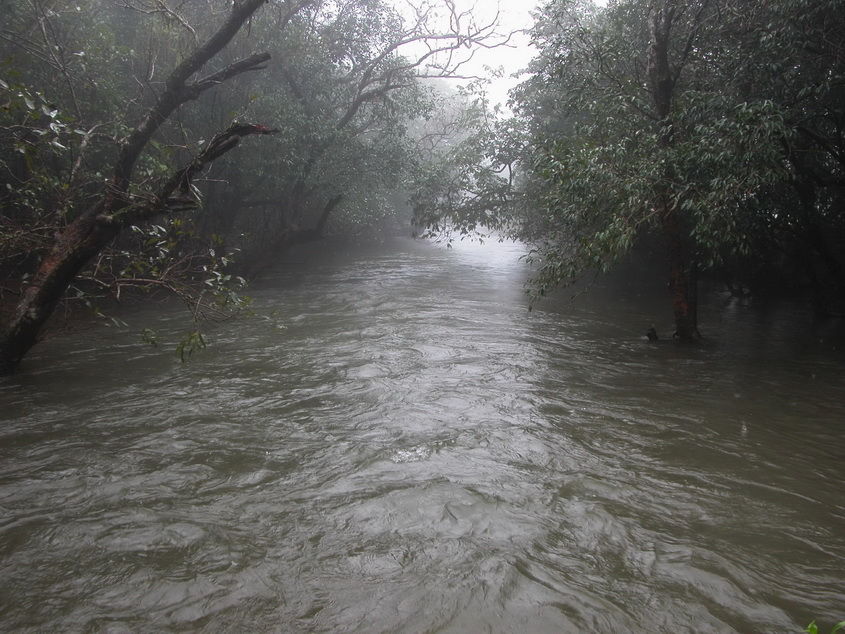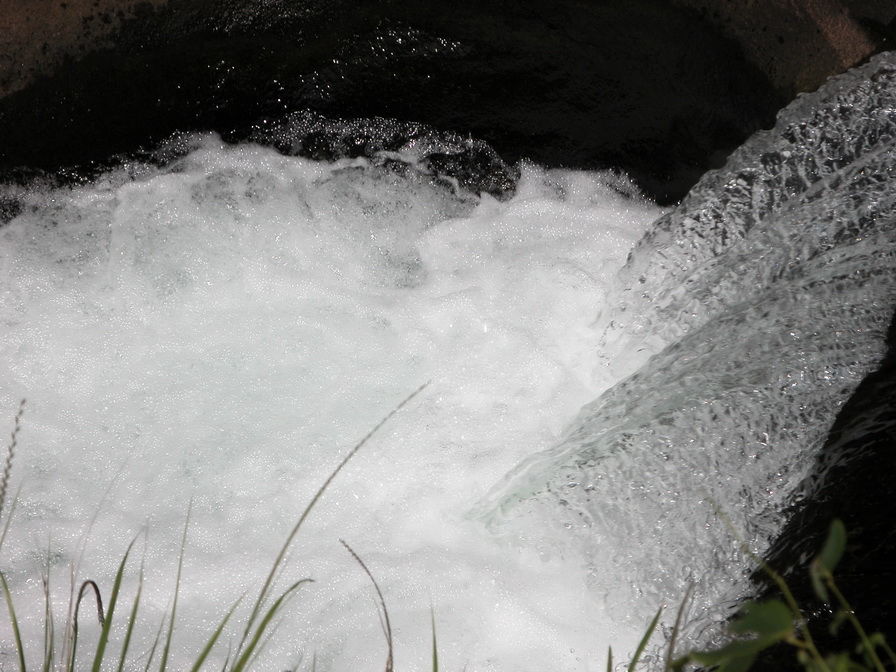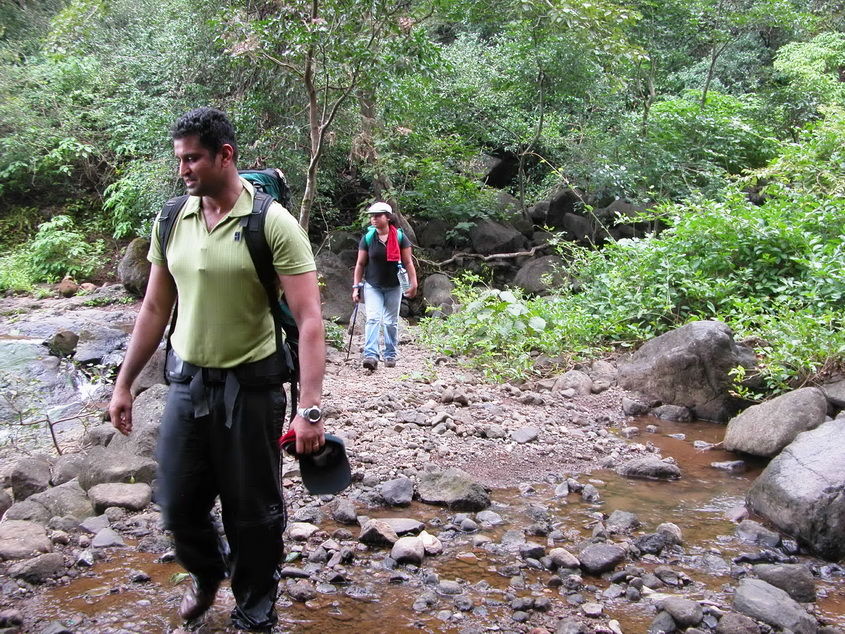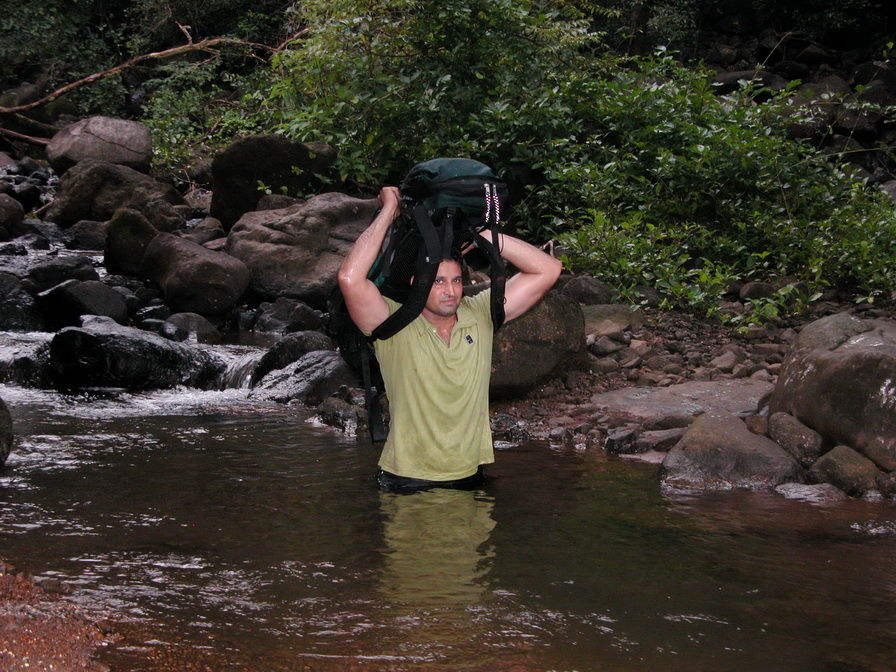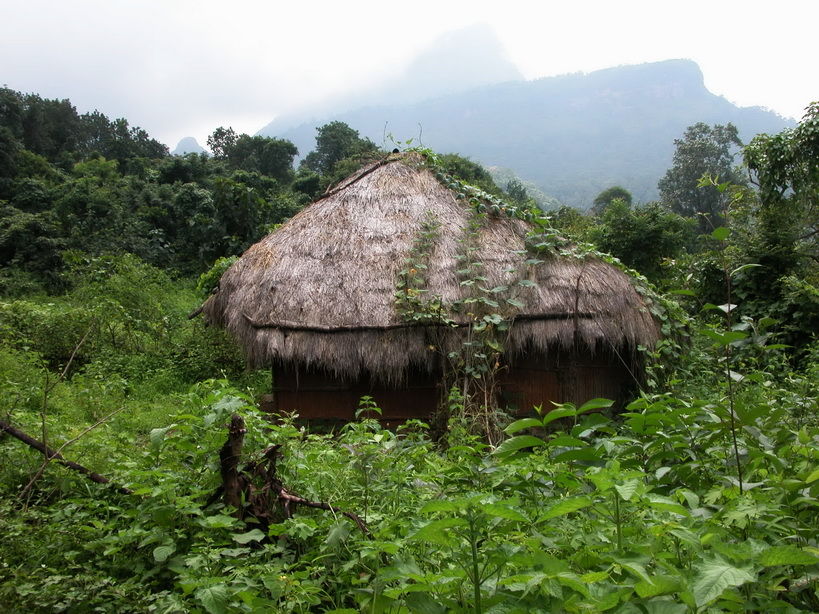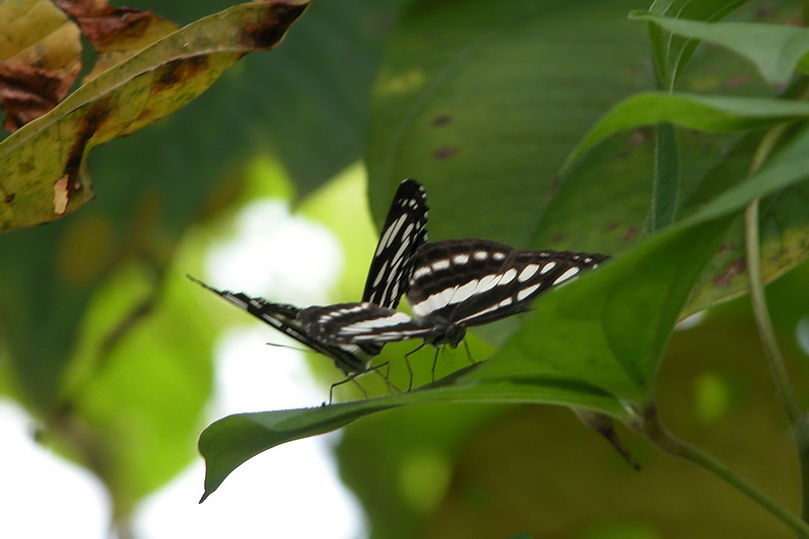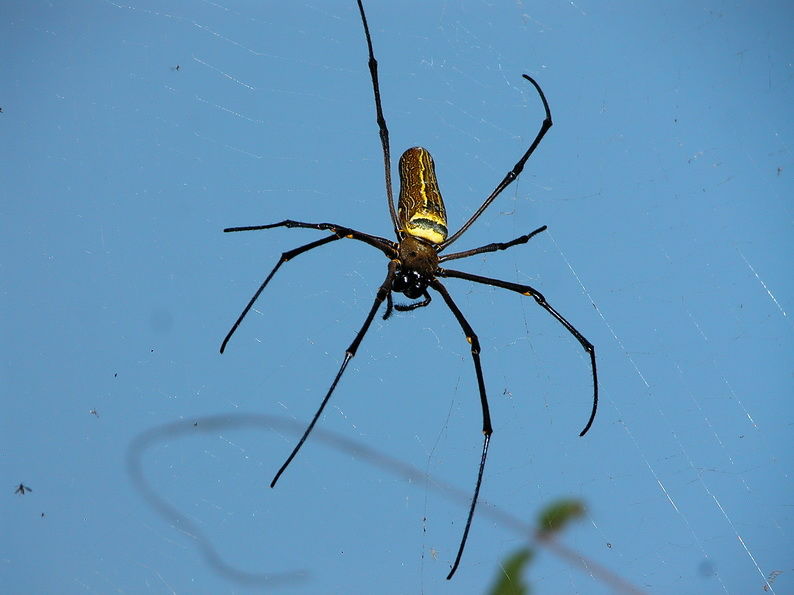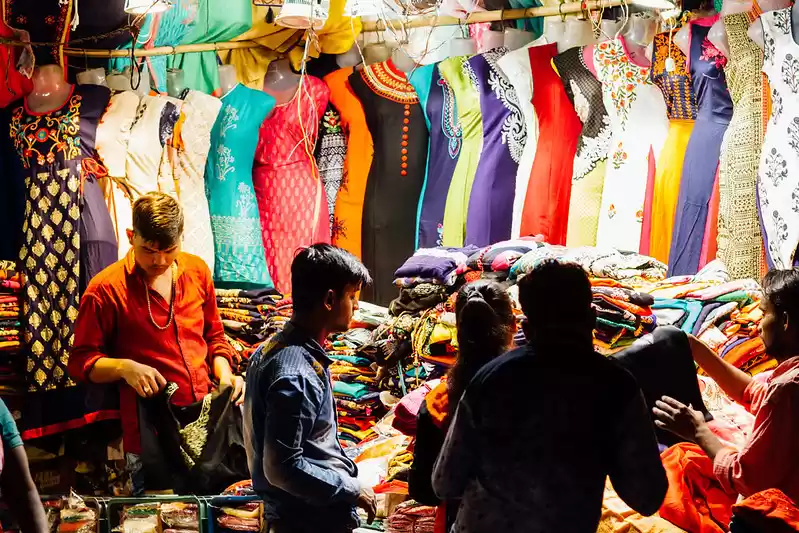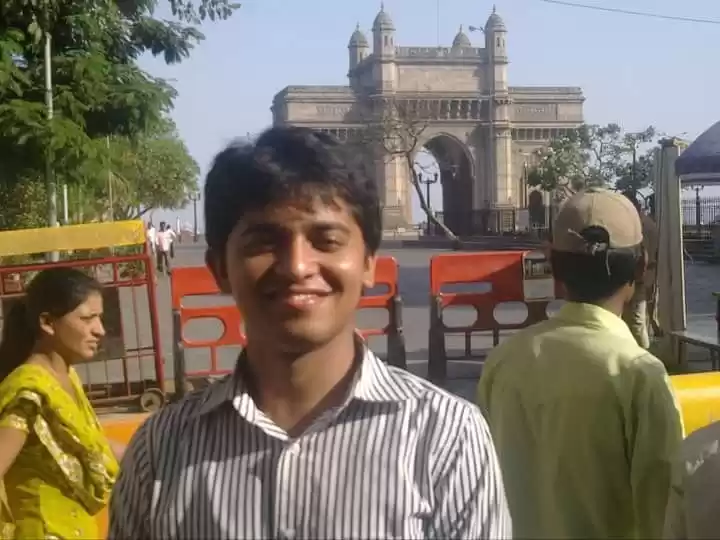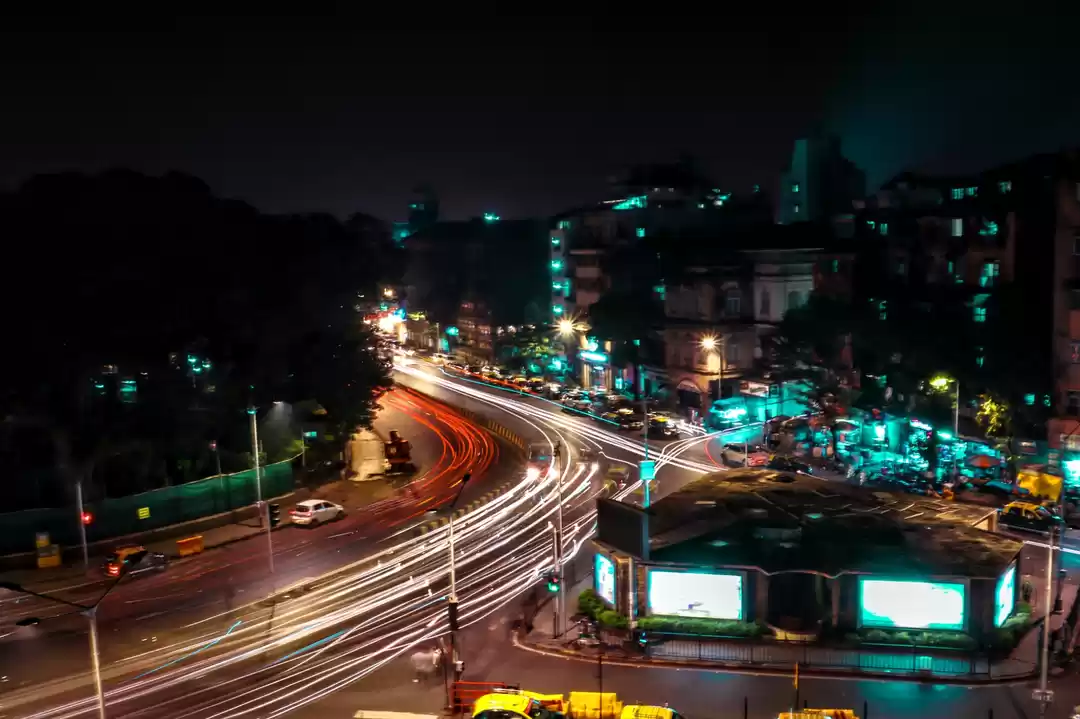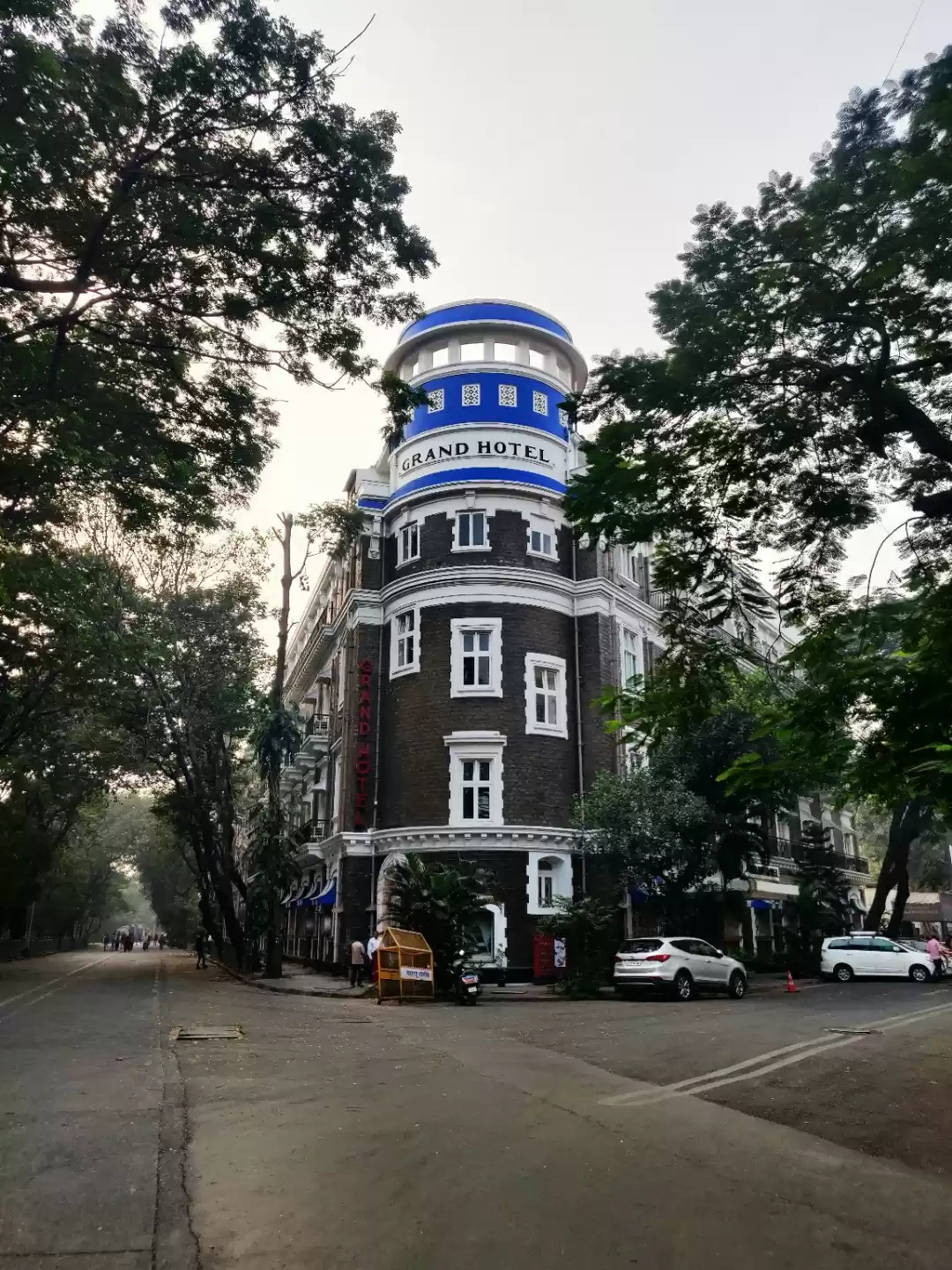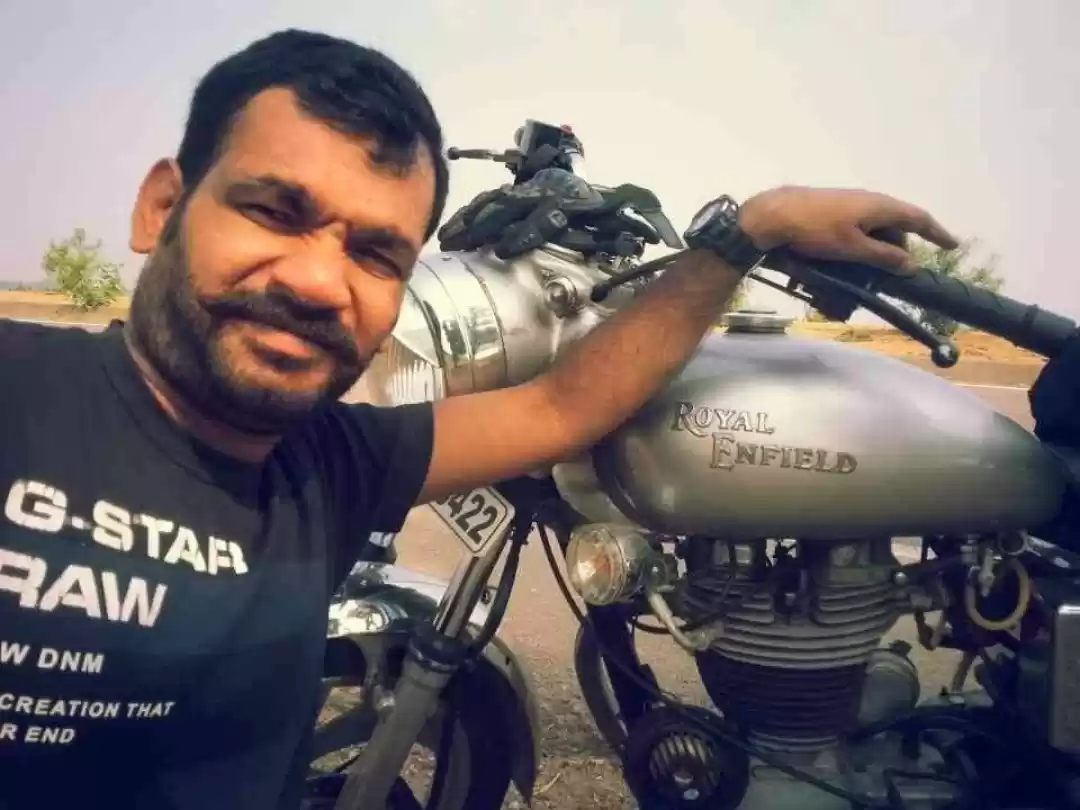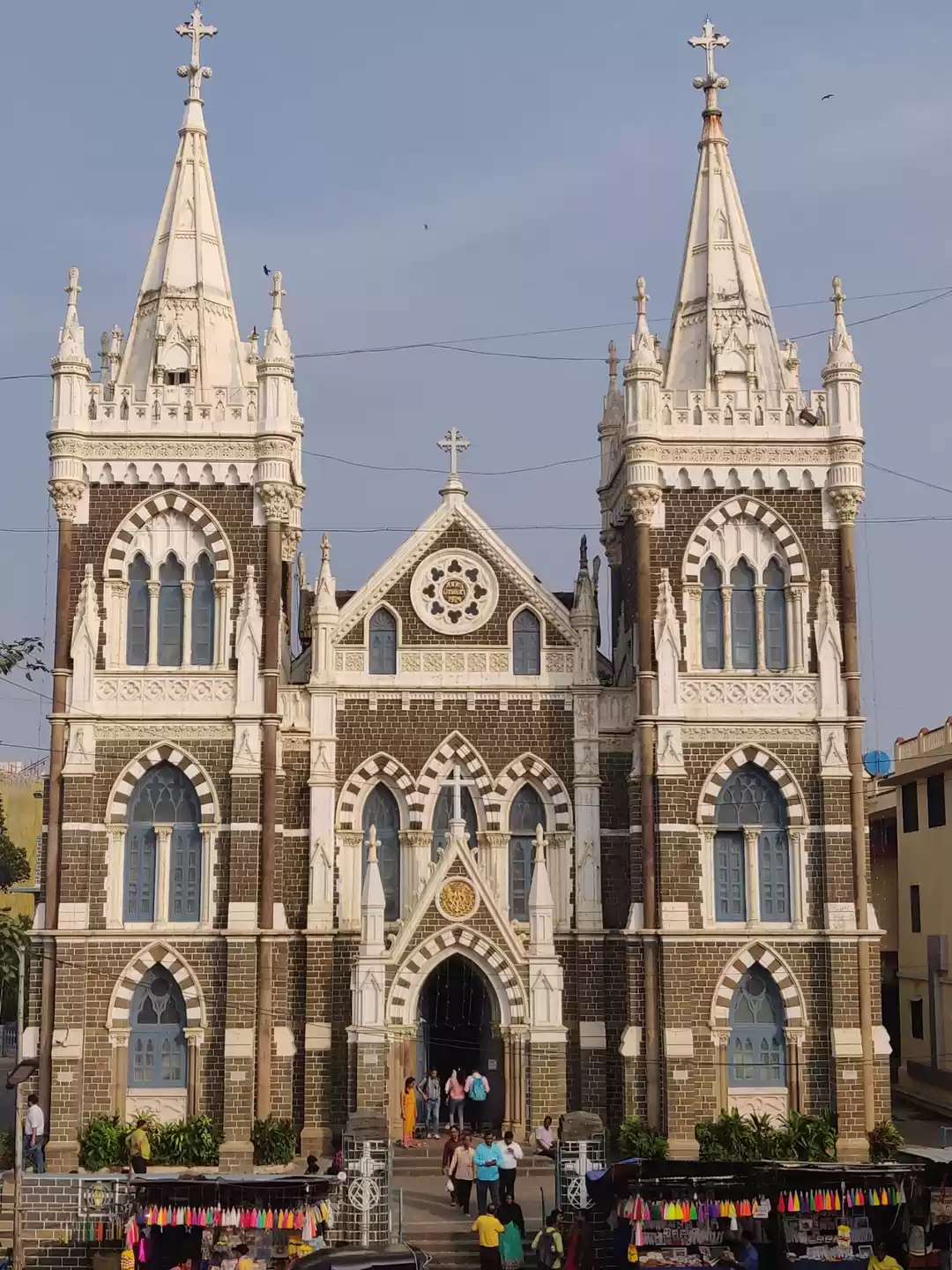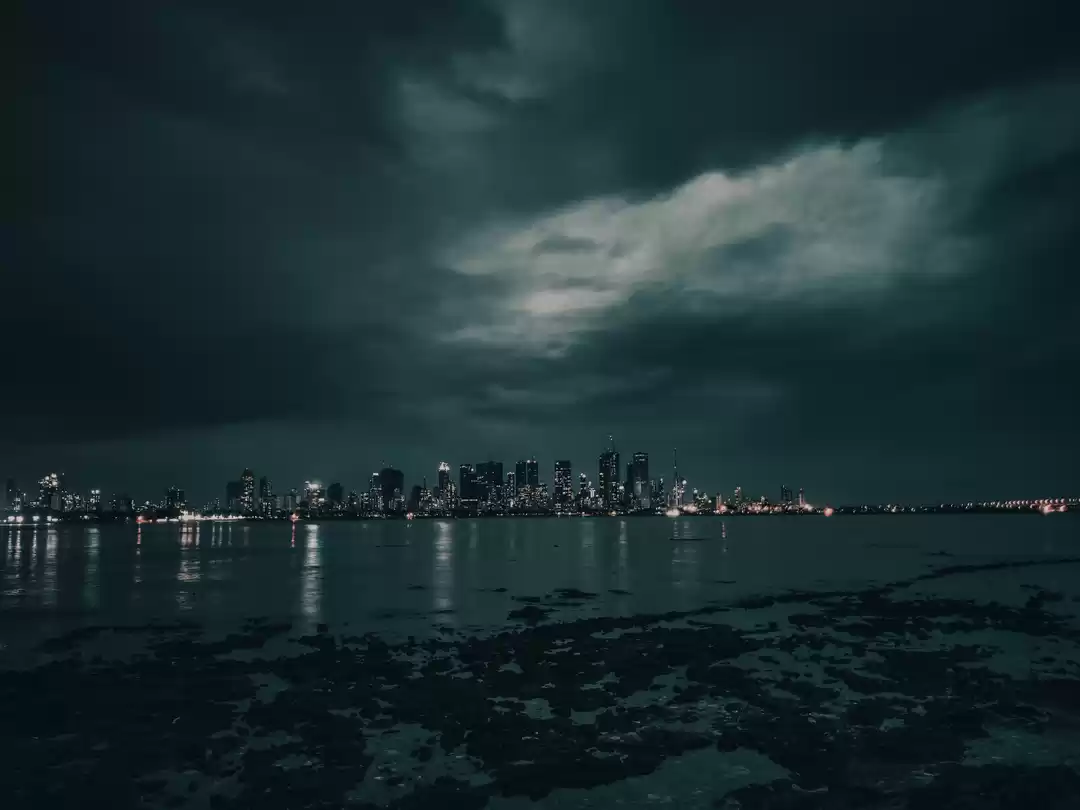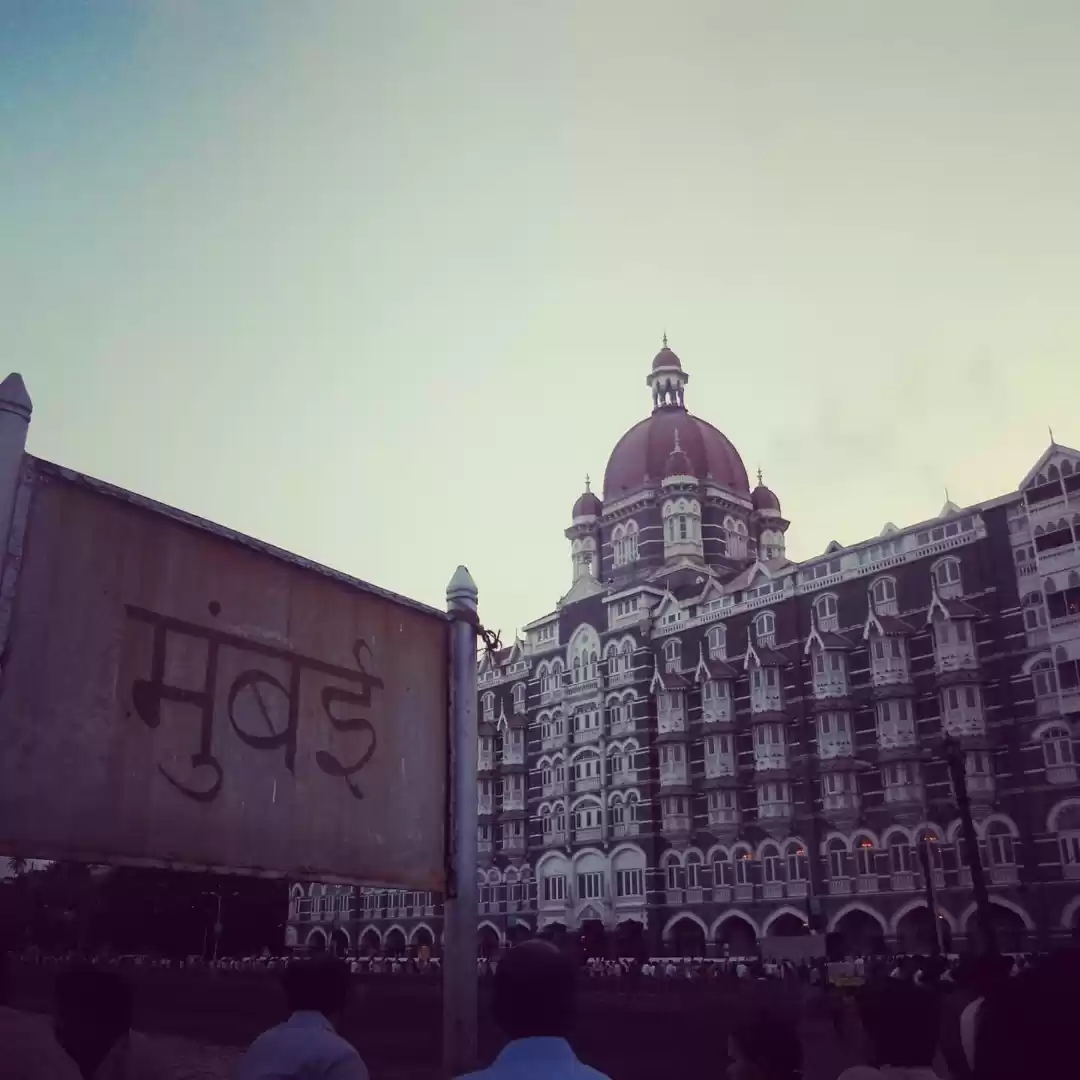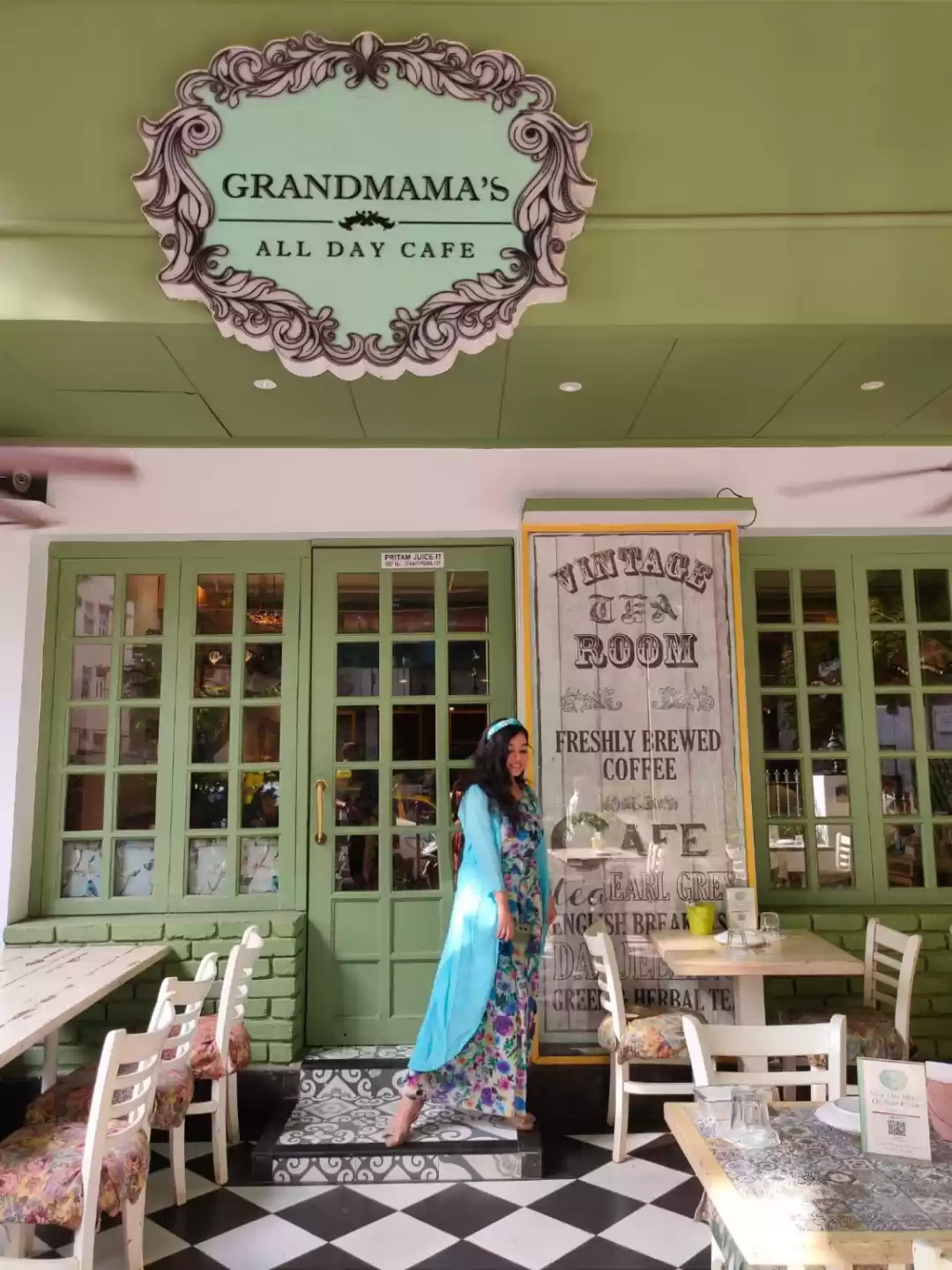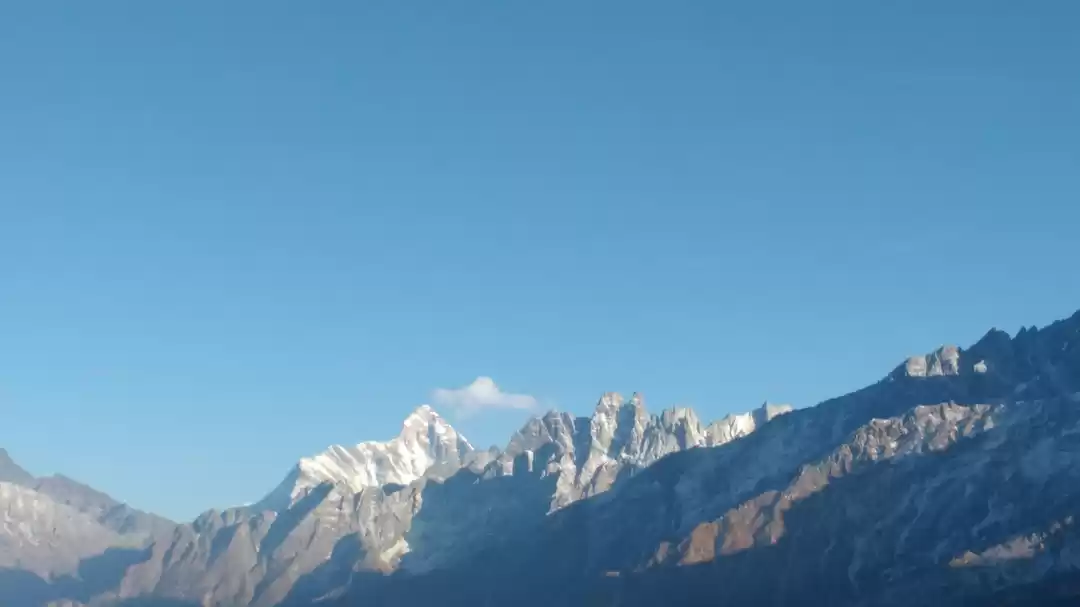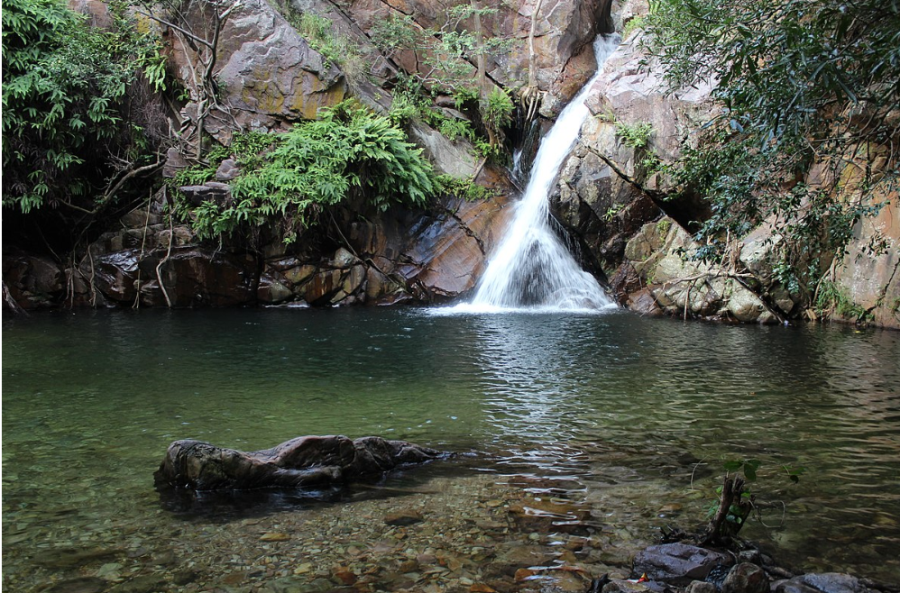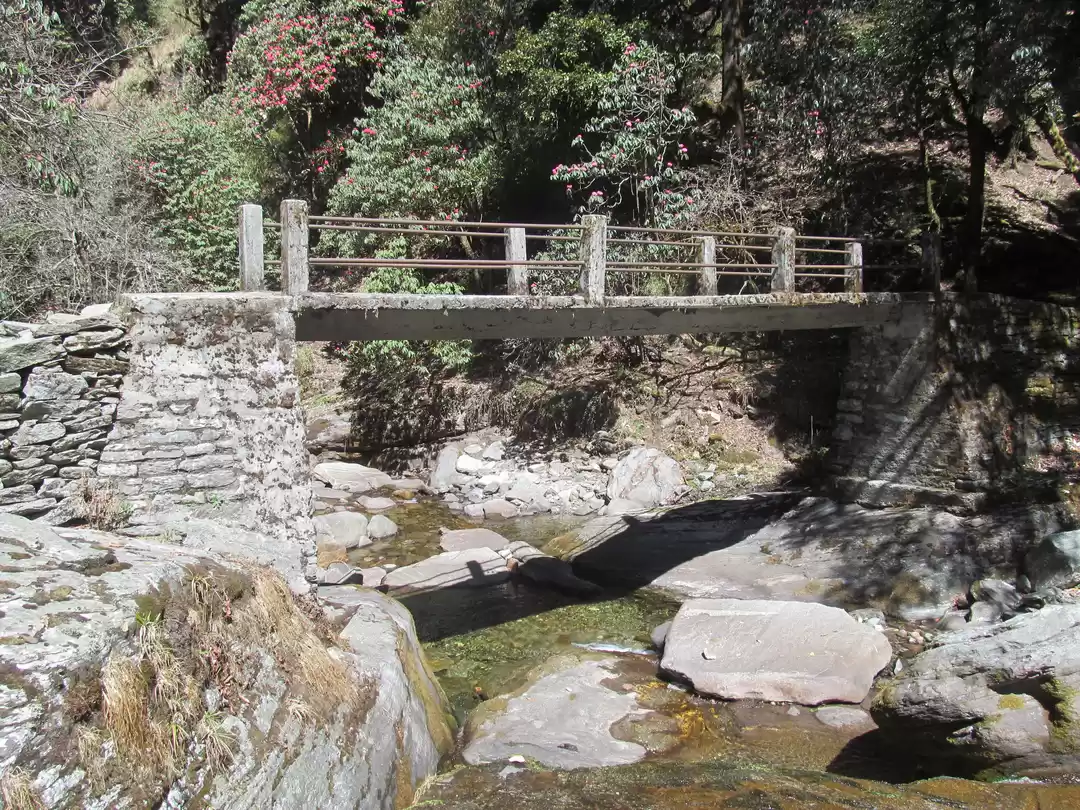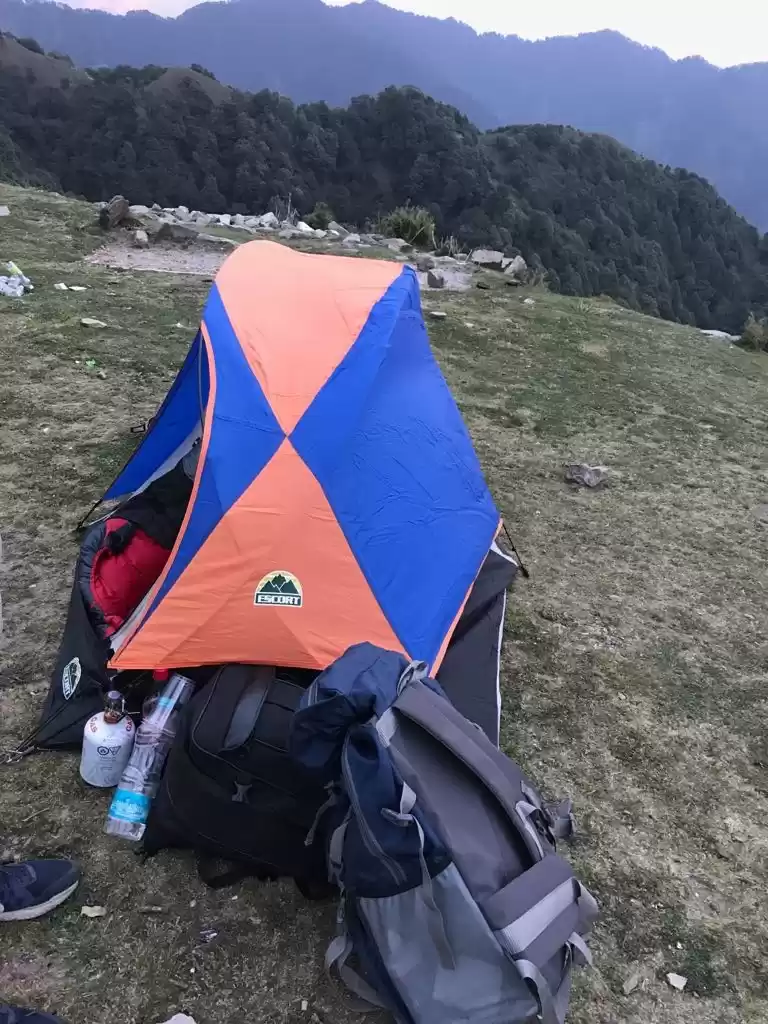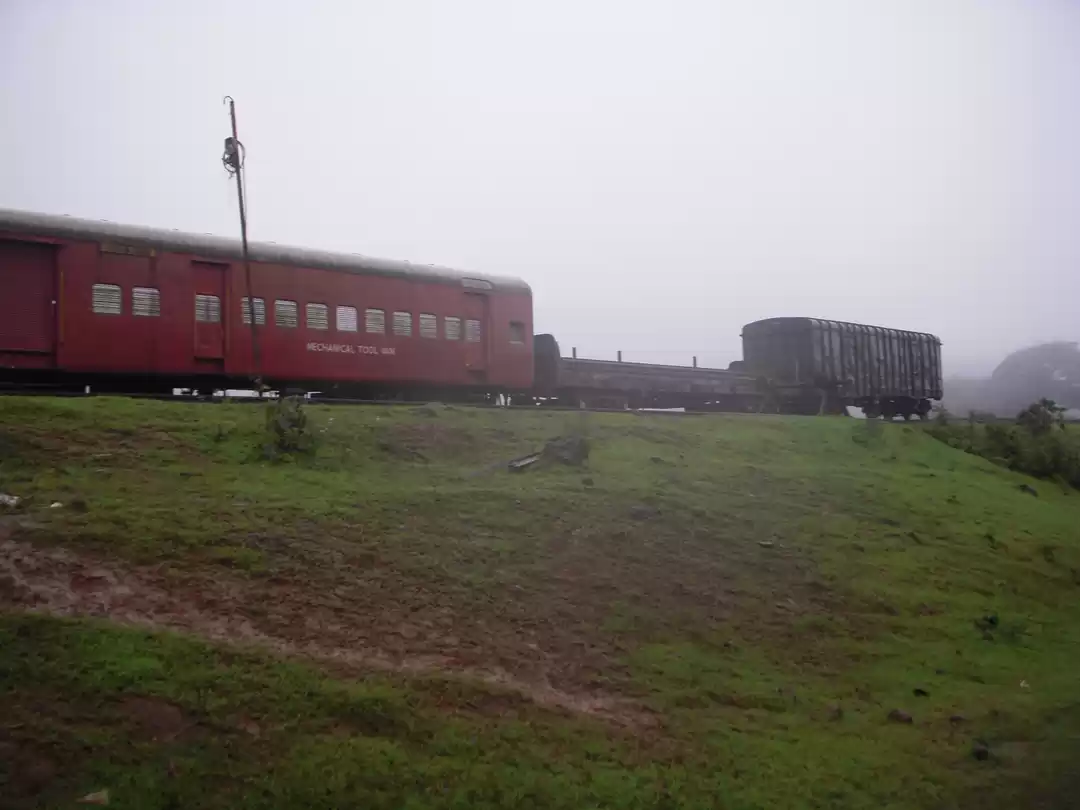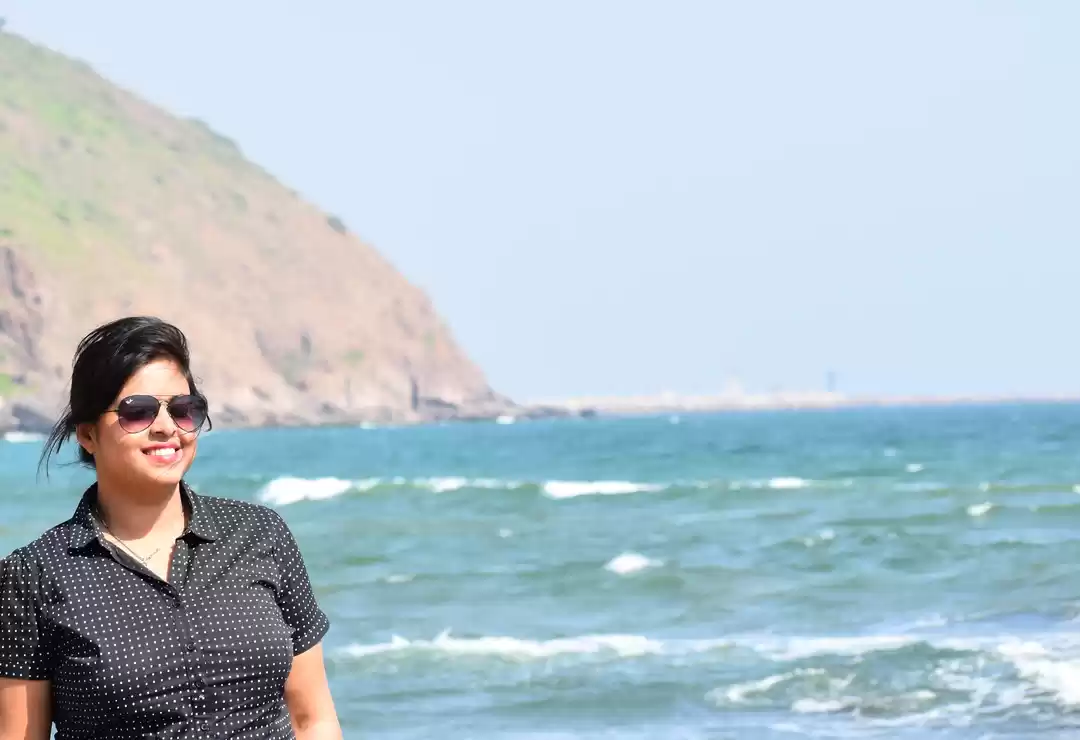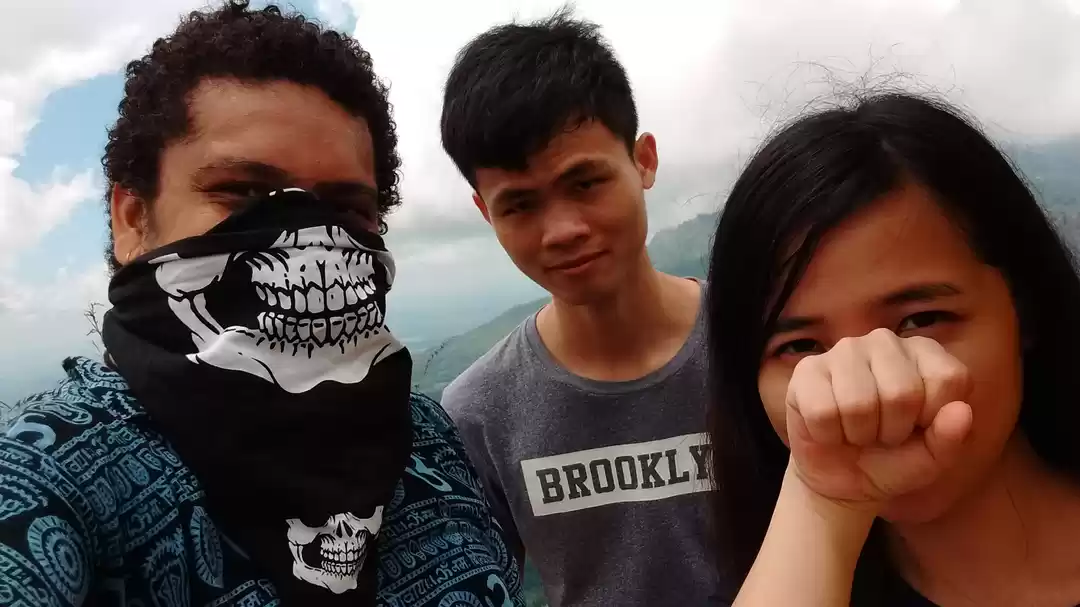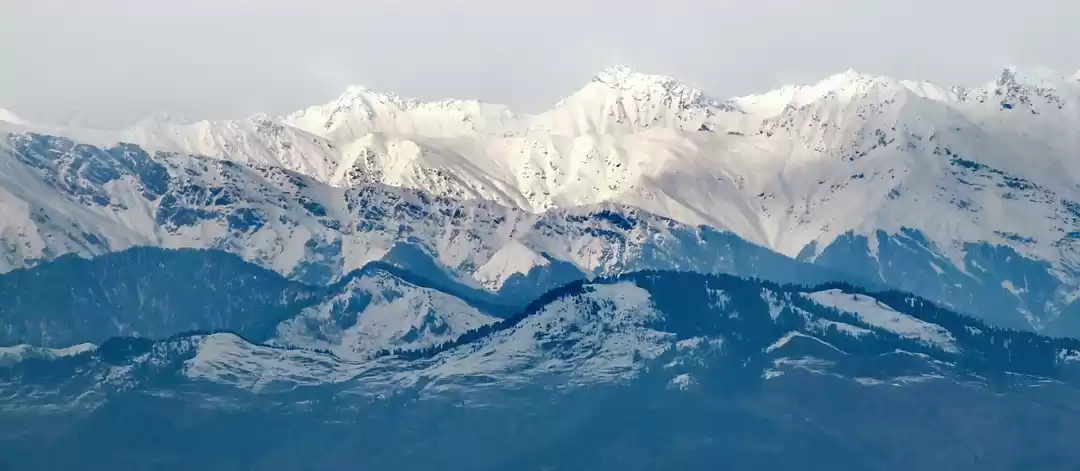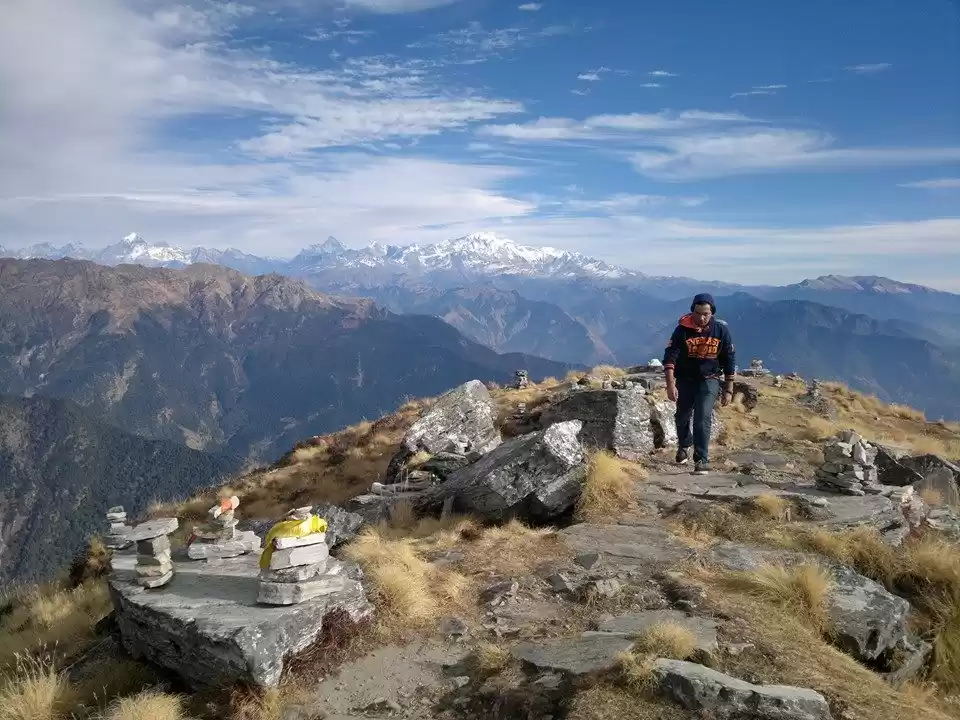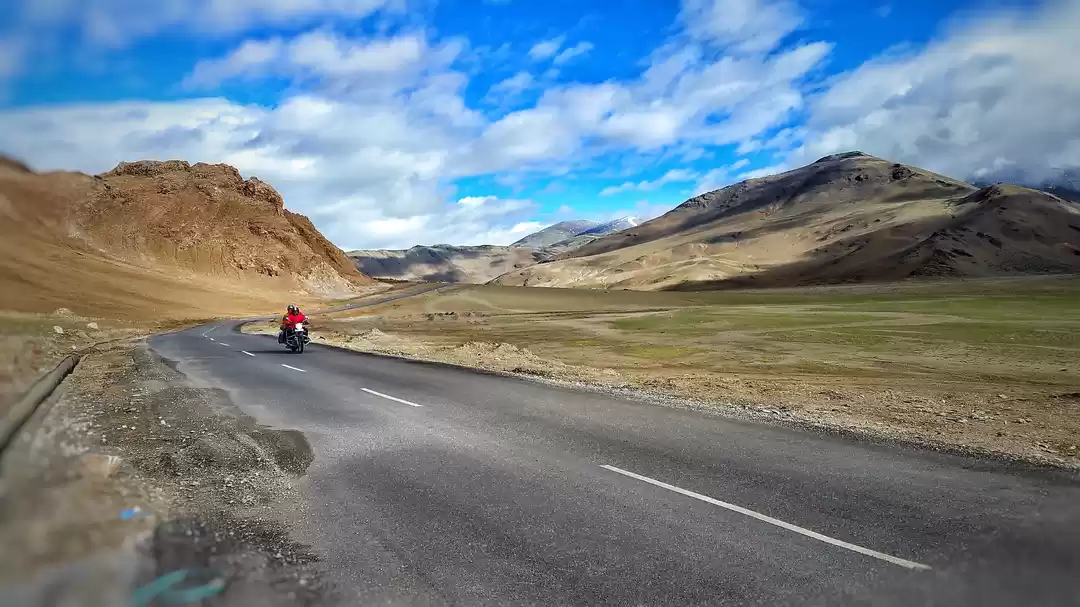The soft pitter patter of the rain falling on my head was like a comforting rhythm. My feet went squelching in the mud but it did not matter. We had been walking in the rain all day and by now we had adjusted to this wet wet world. We walked in silence in the rapidly approaching darkness. As we walked past the few huts that comprised the little hamlet, we heard a female voice cry out. She said something but the words were lost in the moist wind that cooled our faces as we hurried past.
"What was that?" I asked Anil, who was a few paces behind me, "what is she saying?". His command of Marathi was marginally better than mine, or so I thought....thus my appeal to him for a translation. Anil shook his head. "I can't really make out what she is saying."
The voice called out again, but we ignored it and kept walking until we were out of earshot.
As we approached the little stream that we had waded across 8 hours earlier, an ever increasing roar filled the air. It was the sound of fast flowing water as it ran swiftly over the rocky bed and funnelled down into a narrow defile, hurling itself downstream in a series of cascades. On the other side of the stream the cart track continued the few kilometres to the village of Narivali where we had left Anil's Tata Indica earlier in the morning.
I paused at the water's edge till Anil had caught up with me. We exchanged glances. "Looks bad," Anil said plainly. The torrent reflected menacingly in the fading light, its braided swiftness hurtling over the rocks.
"I think we can cross," I said confidently, basing my statement over decades of experience in fording streams in the Sahyadri and the Himalaya.
Anil was not convinced. "I think we should avoid this crossing, it looks downright dangerous to me...."
"Well, there is no other way round this to get to Narivali," I said, "and I don't fancy spending the night here in the hope that the water level will subside by morning." I started uncoiling the 30 foot length of 6 mm nylon rope that I had made a habit of always carrying in my rucksack.
"Why don't you stay on the shore and belay me while I test the waters?" I said apologetically, hoping my tone would convey compromise rather than arrogance.
"Okay," said Anil as he wrapped the rope round his waist, took up a firm stance and watched me inch into the stream, which suddenly had taken on the character of a mighty river. Anil has always struck me as a genial giant: he is big and tall and very strong and I was confident that he could fish me out of the water in case things didn't go the way I planned.
"Are you sure you want to do this?" Anil asked again. "Sure," I replied, "no problem. We'll belay each other across." In my eagerness to get across, I had overlooked the fact that unless we were anchored to a concrete pillar sunk a hundred feet into the ground, a belay was going to be totally ineffectual, given the laws of physics at work at that particular moment.
The ankle deep water swirled round my boots, I could already feel its force as I went a couple of feet further. I was soon knee deep and then waist deep. The velocity of the water kept lifting my foot off the rocky bed as I balanced tentatively on my other foot seeking purchase for my next step. I could feel the pebbles and stones and gravel as they threatened to cut my skin to shreds, hurtling past in diabolical fury.
I paused and looked back at Anil. His bulk formed a reassuring reference point, now more than twenty feet away. A couple of feet in front of me was the torrent's deepest channel where the water shot through like a million bullets encased in H2O and welded together to form a weapon of mass destruction. If I can only get across this bit, I shall be safe, I told myself.. But I needed more slack to reach the other bank.
"Anil, can you wade out into the water about ten feet, I need some more line." Anil nodded and began to wade into the water slowly, till the water swirled around his knees too.
"Watch me, " I yelled out, "the worst part is right in front of me, and if I can cross that, then we are through." Anil nodded, I can't recall whether the head motion indicated assent or "This Guy Is Crazy!"
Again I inched forward into the deepening water, and felt the force almost lifting me off my feet. I tried to shuffle along the bottom, making sure I had both feet making contact with the rocky bed as I progressed. Progress was agonizingly slow and brief. The water suddenly came up to my stomach and it dawned on me that this was dangerous and crazy and insane.
"I am coming back," I shouted above the roar of the river, "take the rope in." I spun slowly around on my two feet, facing where Anil stood. I could feel the current tugging away at the bottom of my feet. I looked down and was mesmerised by the current barely two feet from my face. I knew instantly that this was going to be tricky.
Perhaps the water level had gone up in the last fifteen minutes, perhaps the velocity had increased, perhaps I had lost my nerve; it is hard to tell. As I lifted one foot off the bedrock, a swift current thudded into my other and in the blink of an eye I was airborne and dunked into the water like a fragile twig.
As I was swept along in a headlong rush, the line round my waist came suddenly tight. Anil was at the other end but the momentum of my descent whipped his considerable bulk like a matchstick and he was pulled under as well. My brain was a whirl of confused thoughts racing around like electrons released from their nucleus. This can't be happening, I told myself, I cannot die like this, I have a wife and son in Canada, for god's sake!
Instinctively I took in a huge lungful of air for I knew what was coming : the Big Drop. On my many trips to Siddhgadh, I had admired the three large rock pools as the stream descended the rocky terrain at this point. Now they had been transformed into three roaring cascades, the first one dropping about fifteen feet into what looked like a bottomless pit. I was pummelled into this by gravity and acceleration and suddenly my world was quieter, bubbles rising all around me and I sank rapidly, my rucksack riding up above my head. I had already lost the one trekking pole that I always used, and the treasured cap which I had bought after completing a course from NOLS (National Outdoor Leadership School) at their Pacific Northwest Centre in Conway, Washington state, had been snatched from my head by the aggressive waves. One part of me wondered how deep this hole was while another prayed that my breath would last long enough : I knew that once my downward spiral slowed down, the water would push me back to the surface and into the next pool. That happened just in time; as my lungs screamed for fresh air I was ejected from the liquid maelstrom like a champagne cork being popped at a party.
This was certainly no time to party, though. As I quickly sucked in another lungful of life giving air I was thrust into the second pool. In that brief interim I caught a glimpse of Anil disappearing into the first one above me. The second dunking was not as frightening or deep as the first one and the third one followed in rapid succession. When I emerged from this I was swept along a curving section lined with wet slippery rock which could easily have snapped my limbs or smashed my head into a lifeless pulp had I made contact. I glanced back and could see Anil hurtling along as well.
"Are you all right?" I screamed above the roar of the river. For all I knew he could be dead and what I was seeing was his mere carcass being buffeted by the water. He could have struck the rock at any of the cascades or the pools.
"Yeah", he managed to yell back much to my relief, "I'm fine!"
Surely that was an understatement. We were still travelling at considerable speed, trying desperately to stay afloat. As one wet slimy rocky wall came close I tried to grab at its protuberances, even at the grass that was lining its upper lip in the hope to break my further descent, but to no avail. My fingers slapped ineffectually at the rock and the next current carried me back to the centre of the stream. I had no clue as to how extensive this turbulent section of the stream was and I just prayed that it did not debouch into some massive waterfall that would surely be the end of us.
Try and swim to the shore, we exhorted each other. This was easier said than done. The river kept us firmly in the centre and nothing we did made any difference.
The whole sequence of events must have lasted no longer than a few minutes at the most, but seemed like an eternity at the time. If salvation had not arrived at this precise moment, we might have unwillingly crossed over to that eternal and wholly unknown realm.
Suddenly, the speed of the current slowed down just a little, enough to help us swim towards the shore on the Narivali side. Even better, we could suddenly touch the bottom with our feet and the bottom was sandy. With a new found spurt of energy, we made for the shore and were soon able to wade waist deep and out of the water. As the water dripped from every single pore of our bodies I could see what had made the difference between life and possible death by drowning: the stream here fanned out into a wider channel and at one side a small earthworks dam or bund had created a shallow pool.
Without further ado we took stock of ourselves. There were no serious injuries, only a couple of bruises. My left knee hurt and there was a dull ache on my knee cap. Other than that I was fine. We hugged each other out of relief for being alive and then, the rope still tied but twisted into scores of unfathomable knots between us, sloshed our way in the dark into some bushes. It was still raining and the sound of running water was everywhere.
We had to find our way back to the cart track which led to Narivali. Relying on my memory I figured out in which direction we should be heading. Ten minutes later I found the track, now running in almost knee deep water as it carried all the rain into the stream at the point which we had tried to cross. Turning left onto the track we walked in silence, wet, cold, and suffering from the aftershock of our little misadventure. I told myself to stay calm, there was nothing to it now except follow the track to Narivali, where we could spend the night before heading back to Mumbai.
But we had reckoned without the rain. As we approached the village, another roar filled our ears. As we sloshed our way nearer, the sound was deafening and soon we were looking at another rapid torrent of muddy fast flowing water which separated us from the huts on the other side. We looked at each other and this time there was no debate. No, nothing was going to tempt me into this one! We decided to look for some higher ground to spend the night in and then take stock of the situation at first light.
There was a field to our left and a couple of feet above the cart track. I recalled there were a couple of big trees in the area. We headed for one of them and began to make ourselves comfortable under its canopy, the big trunk acting both as a windbreak and as something to lean our tired bodies against. While we were settling down we heard voices at a distance above the roar of the water and walked around to investigate. The voices seemed to come from a couple of hundred meters away and soon we could see a light, ghostly in its apparent disembodiment, seemingly floating into the distance. We guessed it must be some villagers on their way to somewhere.
We shouted out to them, repeatedly, but there was no response. We resumed our yelling and yet there was no reply, no acknowledgement that we had been heard. Only the roar of the water filled the ether. We went back to our tree.
It was around 8 pm now and we knew it was going to be a long night. We untied the rope, unpacked our rucksacks and took stock : our cellphones were useless, my headlamp had been torn from my head when I was yanked into the water, my precious Nikon FM2 camera was soaked inside and out, every stitch of clothing that we had was drenched, and food wise we had a couple of Parle Glucose biscuits in pulp form and some milk powder, also as a soggy paste. Though my MEC (Mountain Equipment Co-op) T shirt was wicking away moisture as fast as my body heat would allow, Anil was not so lucky. His clothing consisted of almost all cotton and he was going to be damp throughout the night. I decided that we needed to get some warm liquids into our systems, to better last the night.
I unpacked the MSR XGK II stove which had done sterling duty both in the Himalaya and in our local hills. Water had got into every opening, every orifice, every joint and seam. Our matches were soaked and of no use. Anil pulled out a small cigarette lighter that he carried for his stove. This was activated by a flint and of course the flint was wet as well! I dried it as much as I could, shaking beads of water out of it, wiping it with my T shirt, putting it under my armpits and on my stomach, cupping it in the palm of my hands. Finally, I could coax a little spark from it. I poured some gasoline all over the stove and struck the lighter. Flames consumed the stove and after a little while I opened the fuel valve. The rapidly diminishing flame sputtered and fought to stay alive. Some vigorous pumping helped to keep the petrol/water mixture flowing through the fuel lines. The flame was small, but it was enough. And incredibly, we nursed the flame through the night, it kept burning for 9 straight hours, providing us with warm concoctions that we made up with whatever we could salvage from our rations, and keeping us warm through the cool damp night as well.
We tried not to doze off by holding conversations on any topic that came to our heads. Occasionally Anil would go off to replenish our drinking water supply from a channel which drained one paddy field to another.
The night passed pleasantly enough, and there was magic too. Once, when I looked up from the stove, an ethereal scene seemed to float before my eyes: there were clouds shot through with moonlight and they hovered at eye level in a mysterious hollow from whither you might expect fairies and goblins and elves to appear! It might have been an optical illusion, but it stayed for a long time.
The same sense of enchantment had engulfed me on my very first trip to Sidhgadh. It was November and the remnant humidity of the monsoon had yet to dissipate from the western outliers of the Sahyadri, of which Sidhgadh formed a part. It was a relief to start climbing up into the trees. As the sweat poured from my brow I became aware of another, soothing melody; no, not the birdsong which filled the air, but the gentle gurgling of a brook as it washed over rocks and pebbles alongside the path. This is a sound I had always associated with trekking in the Himalaya, where the sound of rivers is never far away, unless you are hiking in some areas of Ladakh or Spiti. To be presented with this bonus more than two months after the end of the rainy season was, to me, almost a miracle. I was hooked on Siddhgadh.
The previous year, 2003, in the very heat of a broiling summer day, my older brother Niral and long time friend Franklyn had lain in a torpor in the shade of some trees among boulders in a dry watercourse, in a state of semi dehydration. As if to compensate us for our labours, a flash of brilliant iridescence with wings descended amongst us : it was a gorgeous male purple rumped sun bird going about its business, oblivious to us hapless supine humans. Earlier, a gulmohur tree in full bloom had lent a welcome dash of colour to a landscape wilting under the heat.
On another occasion, a male Bird of Paradise sailed silently from perch to perch in the woods around a pool of water, its long white tail a vision of ethereal elegance. It was here too that I had seen the Blue Mormon butterfly flitting among the remains of rock crabs. And here too a healthy looking Russel's viper had retreated into the bushes as I came down the trail to the one little hamlet which straddled the track going down to the stream which now had given us such a battering.
Earlier that morning, Anil and I had forded the stream without incident and continued past the cluster of huts as the rain increased in intensity. We were soon at the entrance to Sidhgadh, marked by the crumbling remains of a stone gateway. We took the left fork which leads to the top of the main plateau. The traverse through wooded forests here was another of my favourite walks: here, in an earlier trip, I had caught a glimpse of a Tickell's Blue Flycatcher as it flitted in and out of the bushes in the understorey, its indigo blue feathers lit up by shafts of sunlight penetrating through the leaves of the trees.
On this July day in 2004 we walked on a track which was constantly being swamped by runoffs from the slopes, the rain coming down in sheets, unforgiving in its intensity. Where the trees thinned out a little, we could see the opposite side of the U-shaped valley as it narrowed into a gorge. The edges of the plateau were ringed with thick, frothy, white sheets of water as it gave birth to a hundred new waterfalls as we watched. The clouds and the mists swirled around on the fierce winds which were buffeting the valley; some of the waterfalls defied gravity as they were swept upwards into the air and dissipated into a million droplets. This is a vision from a world of fantasy, I told myself, perfect for the Ektachrome slide film in my Nikon! I paused every so often to capture the scene onto celluloid frames measuring 24 mm by 36 mm, knowing full well that what I really needed was a high end Imax camera to do justice to the spectacle and a state of the art Dolby 7.1 capable recording system to capture the surround sound.
Ah, but these were mere material desires. I consoled myself with the thought that even the hundreds and thousands of god men and purported holy swamis that stalked India were not above craving for worldly goods. On my very first visit to Sidhgadh, I had climbed up the steep track above Sidhgadhchiwadi to a cave under the final cliffs of the mountain to be met by a baba-in-residence. I can smell a fake a mile away, and this one was no different. He tried to scare me with divine vengeance if I did not make a "donation" to his sacred pursuit. I offered him a part of the sandwich that I carried with me, and he had to settle for that! His regular supply of rations was brought up by the villagers below so he could devote his time to higher goals. In retrospect, I guess he was not such a bad egg, compared to the present crop of holy crusaders armed with cell phones, laptops, ATM cards, direct deposit into their bank accounts from gullible devotees, GPS and on the go Wifi! Whatever happened to good old fashioned renunciation of the world!
The top of Sidhgadh is a rather narrow plateau overgrown with thick bushes growing amidst huge boulders barely visible in the monsoon. The karvi blossoms all the way to the top was an adequate spiritual fix for my modest needs.
Sitting under our generous tree, a mere stone's throw from Narivali, we could feel the rain begin to subside around 2 am - my Suunto wrist top computer (as the manufacturer likes to call their watch) had survived the dunking!
At first light we began to pack up and made our way gingerly to the stream at the edge of Narivali. The water level had certainly gone down and the current seemed to have slowed. We crossed over to the few huts on the other side and walked unseen through the narrow muddy lanes. Not a soul stirred, no dogs barked, and we were soon at the little tea stall on the road where Anil had parked his car the day before. It was fifteen minutes before seven o'clock on Thursday 29 July 2004.
Anil turned the ignition and the diesel clattered to life. At Murbad we bought chai and vada pau and warmed ourselves. There was an STD booth from where I called my brother Niral to tell him that I was safe and alive while Anil made a call to his home to instruct his maid to have a hot lunch ready as two very famished hikers were about to present themselves at the dining table!
NOTE : EVERY YEAR MANY HIKERS AND TREKKERS NEEDLESSLY LOSE THEIR LIVES IN THE SAHYADRI AND OTHER HILL RANGES OF THE WORLD DUE TO ERRORS IN JUDGEMENT CAUSED PERHAPS BY AN OVERDOSE OF CONFIDENCE IN THEIR ABILITIES TO COPE WITH FLOOD, FIRE, SCREE, ALTITUDE ETC. OVER CONFIDENCE ON MY PART CERTAINLY PLAYED A ROLE IN OUR NEAR DEATH BY DROWNING ON THE EVENING OF WED 28 JULY 2004. I HOPE MY STORY SERVES AS A CAUTIONARY TALE FOR OTHERS WHO MIGHT BE TEMPTED TO UNDERESTIMATE THE POWER OF NATURAL FORCES.
ACCORDING TO RECORDS KEPT BY THE INDIAN METEOROLOGICAL DEPARTMENT, THE RAINFALL FOR THANE DISTRICT (WHERE NARIVALI IS SITUATED) FOR THE MONTH OF JULY IN 2004 WAS 814 MM. THE TOTAL PRECIPITATION FOR THE SEASON (FROM MAY TO SEPT) WAS 2928.8 MM, WHICH MEANS THAT ABOUT 28% OF THE SEASON'S RAIN FELL IN JULY - AND IF YOU WERE TO ASK ANIL AND ME, WE WOULD PROBABLY TELL YOU THAT 90% OF THAT 814 MM FELL ON THE DAY THAT WE TEMPTED FATE!
Epilogue :
Spurred by a morbid curiosity, I convinced Anil Gangolli and his wife Prabha Bhowmick to revisit the scene of the crime (sic!) five weeks later, on 4 Sept 2004. The pictures below were taken on that day :


